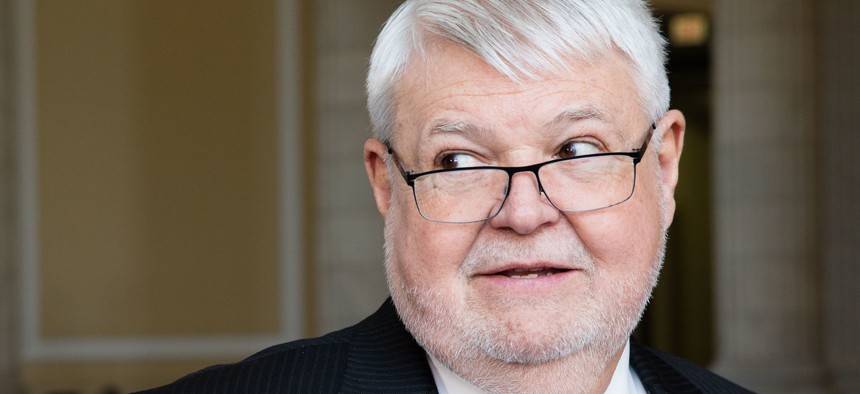
Former AFGE National President J. David Cox has been accused of sexual abuse and harassment. He resigned in February. FLICKR USER AFGE
Victims Sue AFGE Over Former President’s Misconduct
A group of former employees, contractors and union members assert that for years, the upper management of the largest federal employee union turned a blind eye to former President J. David Cox’s sexual harassment and abuse.
A group of former employees, members and contractors of the nation’s largest federal employee union have sued the American Federation of Government Employees and former National President J. David Cox over Cox’s alleged sexual abuse and harassment and the union’s inaction following internal complaints.
Cox was placed on administrative leave last fall following a Bloomberg report outlining allegations from multiple former AFGE employees that he sexually harassed them. He was forced to resign in February, after Annette Wells, a dues-paying union member, accused Cox of engaging in nearly a decade of sexual abuse against her son, who served as his primary driver at a limo company contracted by the union for official travel.
The lawsuit, filed last month in U.S. District Court for the District of Columbia, names Cox, current National President Everett Kelley, and a slew of members of AFGE’s National Executive Council and other senior leaders as defendants. The current union officials stand accused of fostering a culture that turned a blind eye to allegations of harassment, where offices intended to investigate claims of misconduct in actuality shielded Cox from scrutiny.
The plaintiffs accused Cox of routinely sexually harassing staff members both in the union and his personal drivers who worked at the limo company hired by AFGE for official business. He also allegedly frequently used racial slurs and otherwise offensive comments, particularly toward Muslims, and frequently demanded to be driven to bars and strip clubs at the union’s expense.
In the case of Annette Welles’ son, who is listed as John Doe in the complaint, Cox allegedly consistently demanded that he be assigned to drive him, and routinely sexually harassed him, eventually escalating to years of sexual assault and abuse. The plaintiffs said the abuse led to Doe going through a divorce and a severe decline in his health, including “stroke-level high blood pressure” and kidney failure.
During his tenure, Cox reportedly consolidated his power, moving oversight of the union’s HR department from the national secretary treasurer to himself, an act that effectively shielded him from independent investigations of complaints against him. Union officials who called attention to Cox’s conduct were ousted in retaliation, they alleged.
The plaintiffs asked the court to reimburse plaintiffs for lost wages and benefits, with interest, compensation for pain and suffering, and for the union to hire an independent attorney, chosen by the plaintiffs, to oversee a reform plan to institute policies that would prevent such misconduct in the future. They also requested the court force the union to account for the costs associated with Cox’s alleged misuse of funds and recoup those losses.
In a statement, AFGE said it could not speak about specific allegations because of ongoing litigation but noted that the union is in the process of investigating some of the incidents mentioned in the complaint.
“The current officers of the AFGE’s National Executive Council are committed to providing an environment free from discrimination, bullying and harassment,” AFGE stated. “Since the first charges against former President Cox came to light, AFGE has engaged an independent outside firm to investigate the allegations and make recommendations. We have committed substantial resources to that effort and are actively following up to process and implement their recommendations.”
The statement noted that AFGE has begun implementing a number of changes, including: Shifting responsibility for equal employment opportunity complaints from the general counsel’s office to human resources; hiring a new HR director empowered to make policy changes; adopting a new Code of Conduct for behavior at union events; as well as additional investigations of Cox’s conduct while in office.







